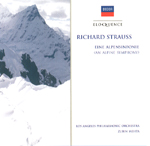Zubin Mehta’s 1976 Alpine Symphony is one of the classic renditions of this much maligned work. This is a big-hearted, no-holds-barred reading that leaps from the speakers, thanks in part to Decca’s vivid engineering, but also to the uninhibited playing by the Los Angeles Philharmonic. Full-throttle best describes Mehta’s Ascent– for once we are being led up the mountain by experienced and energetic (Swiss) Sherpas, rather than the pedestrian guides of so many other recordings. The strings, in particular, have a wonderfully rich sound that really soars in Sunset. Brass playing is glorious in The Summit–while not generating the screaming wall of sound of Karajan’s Berlin Philharmonic on Deutsche Grammophon, their solid, but burnished quality carries more weight. The winds really show off their fleet-fingered skill in the manic Storm sequence. Mehta clearly has the trajectory of Strauss’s piece firmly in mind, as he conducts it in one long arc, like the mountain climb and descent portrayed. The powerful recording betrays its age only in the slight limitation of the dynamic range. A performance in the same league as the classic Kempe account on EMI, and at the Eloquence price, a gift.
































